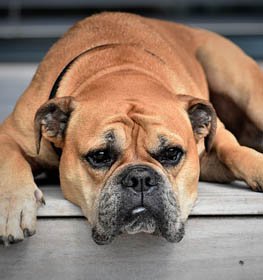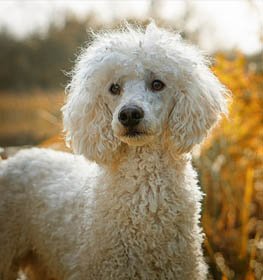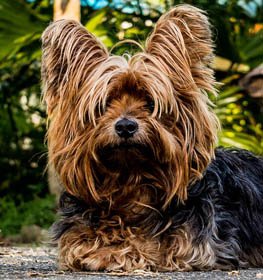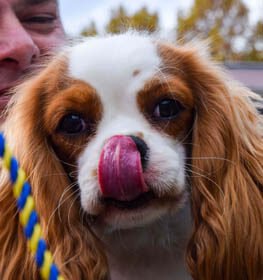French Bulldog Information & Dog Breed Facts
Collection of all the general dog breed info about French Bulldog so you can get to know the breed more.
| Group | Companion Dogs |
|---|---|
| Popularity Rank | 4 |
| Reviews | 7 |
| User Ratings | |
|
Compare the French Bulldog With Other Dogs
Select at least one dog breed to make the comparsion. | |
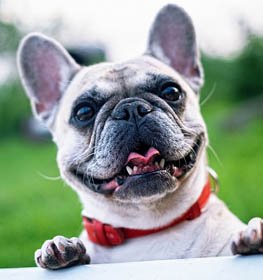 | |
| Origin | |
|
Common Names & Aliases
What other names is a French Bulldog known by? Discover all traditional, regional and informal names used for this breed. | Bouledogue FrançaisFrenchie |
|---|---|
|
Breed Classification
What type of dog breed is a French Bulldog? Learn about its genetic classification and breeding category. | Purebred The French Bulldog is considered a purebred dog breed, but many mixes and hybrids have been created from this breed. We have compiled a list of French Bulldog Mixes. |
|
Size Classification
What size category is a French Bulldog? Learn how big the French Bulldog breed typically grows. | Small |
|---|---|
|
Weight Statistics
How much does a French Bulldog weigh? Discover typical weight ranges for adult males and females of the French Bulldog breed. | 18-30 pounds (8-14 kg) |
|
Average Weight
What is the average weight of a French Bulldog? | There are two weight classes of French Bulldog: 19 - 22 pounds (9 - 10 kg) and 22 - 28 pounds (10 - 13 kg). Over 28 pounds is a disqualification. |
|
Height
How tall is the French Bulldog? French Bulldog height: | 13–16 inches (33–40 cm) |
|
Average Height
What is the average height of a French Bulldog? | 14.5 inches (36.5 cm) |
|
Price Range
How much does a French Bulldog puppy cost? Find current market prices and factors affecting French Bulldog costs. | $2000-$4000 If you choose to purchase the French Bulldog, you should know that the mentioned amount of money is an average of the collected data from breeders’ sites and puppy finder places. If you have a French Bulldog for sale, please advertise it on a reliable website to make sure the French Bulldog gets to a happy place. |
|---|---|
|
Availability
How easy is it to get a French Bulldog? How many French Bulldog are there in the world? | Very frequent: The French Bulldog is quite easy to get. There is a risk of overbreeding, as it is an extremely popular breed. Inbreeding is common because of its popularity. A new study suggests that inbreeding contributes to the incidence of disease and health problems. So be careful, buy from a trustworthy place or kennel and seek the help of an experienced person, a professional, to make the right decision. |
|
Intelligence Rating
How intelligent is a French Bulldog? Discover the French Bulldog's intelligence ranking and learning capabilities. | Low to average: This canine intelligence is not the brightest one. Keep in mind that if you want to teach them any tricks, they understand and memorize new commands in 40-80 repetitions. French Bulldog obey the first command 30% of the time or better. So if you want to have a smart dog, you might have to reconsider your choice with this breed.
The French Bulldog ranks below average in the intelligence ranking of dogs. |
|---|---|
|
Training Difficulty
How easy is it to train a French Bulldog? Learn about the French Bulldog's trainability and response to training methods. | French Bulldog dogs are quite easy to train. Sometimes they can be challenging, but if you're consistent in teaching new commands they will obey for sure. |
|
Watchdog Rating
How good is a French Bulldog as a watchdog? Learn about the French Bulldog's alertness and guarding instincts. | French Bulldog dogs are average watchdogs. If they sense something different, they will alert you, but observation isn't considered their main job.
|
|
Territorial Protection
Is a French Bulldog protective of its territory? Learn about the French Bulldog's guarding instincts and behavior. | French Bulldog dogs are average defenders. Some dogs are very protective of their territory, while others easily let a stranger to trespass. This breed is not sure to defend its territory in every situation. |
|
Personality Traits
What personality does a French Bulldog have? Learn about characteristic French Bulldog temperament and behavior traits. | PlayfulAlertAffectionatePatientLivelyKeenEasygoingAthleticBright |
|---|---|
|
Sensitivity Level
How sensitive are they? French Bulldog sensitivity: | French Bulldog dogs have an average emotional level and are not the most sensitive dog breed. Sometimes it's okay to change the daily routine, have guests and listen to loud music.
Some dogs handle moderate punishment very well, while others crumble apart at a dirty look. This breed is not affected emotionally by moderate punishment. |
|
Affection Level
How affectionate are they? Is a French Bulldog a good family dog? | High: French Bulldog dogs are genuinely loyal, soft and gentle, loving, and affectionate dogs toward their handlers. They enjoy quality time with their owners despite the activity and are considered great therapy dogs for those in need. This breed responds strongly to their handler's emotions because they bond closely. Their happiness is your happiness. |
|
Social Needs
How much social interaction does the Bouledogue Français need? French Bulldog social needs: | French Bulldog dogs need a lot of social interaction. They desire to always be with someone or around people. This breed hates being left alone. |
|
Impulse to Wander or Roam
How likely is the French Bulldog to run away? Does this breed explore or wander a lot? Does French Bulldog roam? | French Bulldog dogs tend to escape less than other breeds. They have low to average wanderlust potential. Exploring the world is not the best activity they can imagine. |
|
Prey Drive
Do this canine have a strong prey drive? Does French Bulldog have high prey drive? | French Bulldog dogs have low to an average impulse to chase and catch something like a cat or any other small aminals. |
|
Barking Frequency
Does a French Bulldog bark a lot? Learn about typical French Bulldog vocalization patterns and triggers. | Low: The French Bulldog barks none to minimal. Perfect choice if you prefer a quiet breed.
Top reasons for barking: protection, alarm, fear, boredom, attention-seeking, greeting, separation anxiety, compulsive barking. |
|---|---|
|
Playful Nature
How playful is a French Bulldog? Understand the typical play drive and energy level of the French Bulldog breed. | French Bulldogs are not the most playful dog breed. Sometimes they do like playing, but that's not their favorite activity. |
|
Apartment Adaptability
Can a French Bulldog live in an apartment? Learn about the French Bulldog's suitability for apartment living. | Very house-friendly dog the French Bulldog breed. It's good if you have a small garden where he can go out and do his business, but it's not important at all. You can get enough exercise with one or two walks a day, so keeping them indoors shouldn't be a problem. |
|
Lifestyle Adaptability
How adaptable is a French Bulldog to lifestyle changes? Learn about the French Bulldog's flexibility to new situations. | French Bulldog dogs adapt very well to lifestyle changes and basically all living environments. They don't mind moving from one place to another with their owner. |
|---|---|
|
Alone Time Tolerance
Can a French Bulldog be left alone? Learn about the French Bulldog's tolerance to solitude. | French Bulldog dogs tend to have separation anxiety when their owners left them alone at home because they bond very closely with them. |
|
Bite Risk Assessment
What is a French Bulldog biting potential? Learn about the French Bulldog's bite risk factors. | Low 🔽 The French Bulldog has a low chance of biting somebody. Top reasons for dog bite: protection, pain, excitement, herding instinct, being provoked. (Data based on the available online bite statistics.) |
|---|---|
|
Mouthing Tendency
Is a French Bulldog mouthy? Learn about the French Bulldog's tendency to use mouth during play. | French Bulldog dogs have an average tendency to nip, chew, playbite, or herd people. It's a common habit during puppyhood, not aggressive behavior. These "bites" don't hurt, but French Bulldog dogs need to be taught a good attitude. |
|
Bite Strength Rating
How strong is a French Bulldog bite? Learn about the French Bulldog's bite force measured in PSI. | Between 100 and 200 PSI 🔽 French Bulldog bite force: Weak. The French Bulldog bite force is considered weak when compared to other dog breeds. The bite force French Bulldog measurements usually fall below 200 PSI, making them one of the breeds with the weakest bite force. The bite force of a French Bulldog may be weak, but it's important to remember that any dog's bite can still be dangerous if not managed properly. Despite the bite force of French Bulldog being lower, it does not make them any less lovable or enjoyable as pets.
French Bulldog bite wounds might not be as severe, but it is still essential to be cautious and prevent any biting incidents. They are usually not aggressive and very friendly towards children and other animals. To ensure a well-behaved dog, it's essential to learn how to train a French Bulldog puppy not to bite from an early age. With proper training and socialization, a French Bulldog can be a wonderful addition to any family, providing love and companionship for years to come. |
|
Average Lifespan
How long does a French Bulldog live? Learn about the typical lifespan of the French Bulldog breed. | 10-12 years The average lifespan of French Bulldog: 11 years |
|---|---|
|
Climate Tolerance
How well does a French Bulldog handle different weather? Learn about the French Bulldog's climate adaptability. | Prefers average to warm weather conditions Different dogs have different preferences when it comes to weather conditions. However, in general, most dogs prefer average to warm weather conditions, as they typically find hot weather conditions to be uncomfortable and taxing. |
|
Health Concerns
What health issues are common in a French Bulldog? Discover typical conditions affecting the French Bulldog breed. | The French Bulldog is a healthy breed, but there are certain health issues that you should check with your vet regularly. |
|
Vet Care Frequency
How often does a French Bulldog need vet visits? Learn about the French Bulldog's veterinary care requirements. | Average The French Bulldog should have a complete physical check-up at least once per year. If your dog shows any symptoms, call your veterinarian. |
|
Health Problems
What genetic/health problems does the French Bulldog breed have? What are the health issues and concerns of the French Bulldog breed? Most common health risks of French Bulldog: | Hip Dysplasia Patellar LuxationAllergiesVon Willebrand's DiseaseIntervertebral Disk DiseaseCleft PalateBrachycephalic SyndromeElongated Soft PalateHemi-vertebrae |
|
Energy Rating
How energetic is a French Bulldog? Understand daily activity needs of the French Bulldog breed. | French Bulldog dogs have an average energy level, so if you live a semi-active life, this breed can be a good choice for you. |
|---|---|
|
Activity Requirement / Exercise Need
How much exercise does a French Bulldog need? How much exercise do French Bulldog dogs require per day?
Do French Bulldog dogs need a lot of exercises? | French Bulldog dogs exercise need is minimal. If you live a slow life, this breed can be a good choice for you. |
|
Sleeping Need
How much sleep does the French Bulldog breed need? | French Bulldog dogs sleep 12-14 hours a day as an average dog and they're not considered a lazy breed. |
|
Obesity Tendency
Is a French Bulldog prone to weight gain? Learn about the French Bulldog's obesity risks. | Average to High: If you don't pay attention to the French Bulldog's weight, he can easily gain weight. More than one daily walk should be on schedule. To make your dog happy and fit, feed him with quality dry dog food and live an active life together. Try to find the happy medium between exercise and feeding.
If you notice any weight gain, consult your veterinarian and make a diet plan. Reduce unhealthy food and snacks, and measure the French Bulldog weight regularly. |
|---|---|
|
Food Consumption
How much food does a French Bulldog need daily? Learn about the French Bulldog's feeding requirements. | Recommended daily amount: 1 to 1.5 cups of high-quality dry food a day, divided into two meals. |
|
Allergy Friendliness
Is a French Bulldog hypoallergenic? Learn about the French Bulldog's suitability for allergy sufferers. | No French Bulldog dogs don't do well with allergy sufferers by causing allergic reactions. Some dog breeds are even considered to higher possibility of an allergic response. Coat type isn't necessarily relevant, because most people are allergic to dander (flakes on the dog's skin) or saliva, not actually to dog hair. |
|---|---|
|
Coat Colors
What colors does a French Bulldog come in? Discover all possible French Bulldog color variations. | Cream White Fawn Brindle |
|
Grooming Requirements
How much grooming does a French Bulldog need? Learn about French Bulldog coat maintenance requirements. | Easy to groom: The French Bulldog doesn't require a lot of grooming. Seasonal flea treatment is needed, but cutting the dog's hair by a professional groomer isn't necessary. Ears and eyes should be cleaned regularly to avoid infections. French Bulldog is a good choice if you don't have the time, skill, or money to take care of a high-maintenance dog. Recommended for beginners. |
|
Drooling Tendency
Does a French Bulldog drool a lot? Learn about the French Bulldog's drooling habits. | The French Bulldog is a perfect example of a very low drooling tendency. If you're disgusted by slobber spots on your clothes, the French Bulldog could be a perfect choice for you. Drooling is the unintentional saliva flowing outside of the mouth. It can be completely normal or a sign of a health problem. Certain dog breeds drool minimum compared to others, just like the French Bulldog.
If you notice any change in your dog's drooling habit, you should contact a vet as soon as possible. |
|
Stinkiness Rating
Does a French Bulldog smell bad? Learn about the French Bulldog's natural odor levels. | Medium ⏺ The French Bulldog has an average chance of bad smell. Top reasons for dog stinkiness: infection of bad tooth/ear/skin folds, gas attacks. |
|
Coat Characteristics
What type of coat does a French Bulldog have? Learn about the French Bulldog's fur characteristics. | FineSmoothShortClose in texture |
|
Bathing Needs
How often does a French Bulldog need baths? Learn about the French Bulldog's bathing requirements. | 6-8 weeks Rarely. Bathing your dog is beneficial to them in more ways than just one. It’s also a good time to look for unusual scratches, bumps, fleas, and other irregularities. When their hair is wet and flat against their body, these details are more visible.
For example, short-haired dog breeds can go a very long time in between baths. These short-haired breeds shed regularly and that shedding works to naturally remove excess dirt and oil. So unless your weenie dog got into the garbage can, you can probably hold off on a bath for a while. |
|
Shedding Level
How much do French Bulldog dogs shed? How to control, reduce and prevent the shedding of the Bouledogue Français? Do French Bulldog dogs shed a lot? | French Bulldog dogs are low shedders. It's a natural process of the hair growth cycle. The amount and frequency of hair loss mostly depend on their health status and breed type. |
|
Child Compatibility
Is a French Bulldog good with children? Learn about the French Bulldog's behavior around kids of different ages. | French Bulldog dogs are not the most kid-friendly dogs. If you have children, you may have to reconsider your choice of having a puppy from this breed.
|
|---|---|
|
Pet Compatibility
How well does a French Bulldog get along with other pets? Discover the French Bulldog's compatibility with other animals. | French Bulldog dogs usually don’t get on well with other pets. |
|
Stranger Friendly
Are they aggressive or friendly towards/with strangers? French Bulldog temperament with other people: | French Bulldog dogs are stranger-friendly dogs. |
|
Cat Friendly
How well do French Bulldog dogs get along with cats? Are they good with kittens? What is this fido's temperament with cats? Can they be good with cats? Can the French Bulldog breed live with a cat? | French Bulldog dogs are not the most cat-friendly dogs. |
|
Dog Friendly
Is French Bulldog good with other dogs? Are they dog-friendly dogs? How well do French Bulldog dogs get along with other dogs? | French Bulldog dogs are not the most dog-friendly dogs. If you want more dogs in your family or you'd like to join dog meetups, the French Bulldog is not a good choice. |
|
Good For First Time Owners
Is French Bulldog breed good for first-time owners? Do they make a good dog for novice owners? Is French Bulldog breed suitable for first-time owners? | Yes French Bulldog dogs are good for novice owners, due to their easy-going personality. |
|
Office Friendly
Are French Bulldog dogs good office canines? Do French Bulldog dogs make good office-friendly pets? Can they be office dogs? | Yes French Bulldog is one of the best dog breeds for office environment |
|
Senior Citizens Friendly
Are they senior citizens friendly dogs? How well do French Bulldog dogs get along with the elderly people? What is the Bouledogue Français temperament with senior people? Are French Bulldog dogs good for elderly owners? | French Bulldogs are not the best breed for elderly people. |
|
Service Dog Capability
Can a French Bulldog be a service dog? Learn about the French Bulldog's service work potential. | Not really This breed generally not used as a service dog. A service dog is a term used in the USA to refer to any type of assistance dog specifically trained to help people who have disabilities, such as visual impairment, hearing impairments, mental disorders, seizures, mobility impairment, and diabetes. Service dogs are protected under the ADA (Americans with Disabilities Act).
French Bulldog is not the best breed for service purposes. |
|---|---|
|
Therapy Work Suitability
Is a French Bulldog good as a therapy dog? Learn about the French Bulldog's therapy work aptitude. | Yes This breed makes a perfect therapy dog. A therapy dog is a dog that might be trained to provide affection, comfort, and love to people in hospitals, retirement homes, nursing homes, schools, hospices, disaster areas, and people with anxiety disorders or autism.
French Bulldog breed is a good choice for therapeutic purposes. |
|
Scent Detection Ability
Is a French Bulldog good at detection work? Learn about the French Bulldog's scenting abilities. | Not really They are not typically employed for this type of work, but there may be exceptional cases. A detection dog or sniffer dog is a dog that is trained to use its senses (mostly its smell) to detect substances such as explosives, illegal drugs, wildlife scat, currency, blood, and contraband electronics such as illicit mobile phones.
French Bulldog is not the best breed for detection purposes. |
|
Search & Rescue Potential
Can a French Bulldog do search and rescue? Learn about the French Bulldog's SAR capabilities. | Not really This dog breed is not typically used as a search and rescue dog. The use of dogs in search and rescue (SAR) is a valuable component in wilderness tracking, natural disasters, mass casualty events, and locating missing people.
The French Bulldog is not the best breed for SAR purposes. |
|
Maritime Work Ability
Is a French Bulldog good on boats? Learn about the French Bulldog's maritime capabilities. | Not really French Bulldog breed usually doesn't like being on a boat. Boat dogs were typically bred for their strength, stamina, and water resistance, as they were often required to perform tasks such as pulling in fishing nets, and jumping into the water to retrieve ropes or lines, or helping to move cargo. Sailor dog is a type of dog that was bred to accompany sailors on their voyages. They were typically used for three purposes: as a working dog, a watchdog, and as a companion. A boat dog is a term used to describe a type of dog that was traditionally bred and used as a working dog on boats. |
|
Draft Work Capability
Can a French Bulldog pull carts? Learn about the French Bulldog's drafting abilities. | Not really A drafting dog or draft dog is a dog bred and used for cart pulling. Dogs bred for this work have strong builds and qualities that are needed, strength and determination.
French Bulldog is not the best breed for drafting purposes. |
|
Military Service Background
Was a French Bulldog used in military service? Learn about the French Bulldog's military history. | Not really In history, this breed was not really used for combat dog. |
|
Puppy Litter Size
How many puppies does a French Bulldog usually have? Learn about typical litter sizes. | 3-5 puppies |
|---|---|
|
Pregnancy Duration
How long is a French Bulldog pregnant? Learn about the French Bulldog's gestation period. | 60-64 days Reproductive cycle of the female French Bulldog: The first period called Proestrus lasts for about 9 days.
During this time the females start to attract males. You can notice by swelling vulva and bloody discharge. The second part is the Estrus when the female is receptive for the male. It lasts for about 3 to 11 days. The sign of the proestrus part is the soft and enlarged vulva. The discharge decreases and lightens in color. The third part is the Diestrus. Normally, it occurs around day 14. In this period the female’s discharge changes for vivid red and coming to its end. The vulva returns to average, and she will no longer permit mating. The fourth part called the Anestrus. The time frame between heat periods normally lasts about six months. |
|
Breeding Frequency
How often can a French Bulldog have puppies? Learn about safe breeding intervals. | Once a year. More frequent breeding is not healthy. It is very important not to buy a dog from a puppy mill, where the needs of the pups and their mothers are ignored. It's an inhumane high-volume dog breeding facility, where puppies born several times a year. |
|
AKC Classification
What AKC group is a French Bulldog in? Learn about the French Bulldog's AKC classification. | Recognized by the American Kennel Club in 1898 as a Non-Sporting breed. |
|---|---|
|
FCI Classification
What FCI group is a French Bulldog in? Learn about the French Bulldog's international classification. | Recognized by FCI in the Companion and Toy Dogs group, in the Small Molossian type Dogs section. |
|
Kennel Club Recognition
Which kennel clubs recognize a French Bulldog? Learn about the French Bulldog's official recognition. | American Canine RegistryAmerican Kennel ClubAmerica's Pet RegistryCanadian Kennel ClubDog Registry of America Inc.Federation Cynologique InternationaleKennel Club of Great BritainNorth American Purebred Registry, Inc.American Canine Association, Inc.Australian National Kennel CouncilContinental Kennel ClubNational Kennel ClubNew Zealand Kennel Club |
French Bulldog Pros and Cons
- Apartment Adaptability: Very house-friendly dog the French Bulldog breed.
- Grooming Requirements: Easy to groom: The French Bulldog doesn't require a lot of grooming.
- Shedding Level: French Bulldog dogs are low shedders.
- Drooling Tendency: The French Bulldog is a perfect example of a very low drooling tendency.
- Impulse to Wander or Roam: French Bulldog dogs tend to escape less than other breeds.
- Lifestyle Adaptability: French Bulldog dogs adapt very well to lifestyle changes and basically all living environments.
- Office Friendly: French Bulldog is one of the best dog breeds for office environment
- Good For First Time Owners: French Bulldog dogs are good for novice owners, due to their easy-going personality.
- Therapy Work Suitability: This breed makes a perfect therapy dog.
- Intelligence Rating: Low to average: This canine intelligence is not the brightest one.
- Allergy Friendliness: French Bulldog dogs don't do well with allergy sufferers by causing allergic reactions.
- Obesity Tendency: Average to High: If you don't pay attention to the French Bulldog's weight, he can easily gain weight.
- Alone Time Tolerance: French Bulldog dogs tend to have separation anxiety when their owners left them alone at home because they bond very closely with them.
- Child Compatibility: French Bulldog dogs are not the most kid-friendly dogs.
- Cat Friendly: French Bulldog dogs are not the most cat-friendly dogs.
- Dog Friendly: French Bulldog dogs are not the most dog-friendly dogs.
- Senior Citizens Friendly: French Bulldogs are not the best breed for elderly people.
French Bulldog History
From the Molossus breed came a sub-family of breeds and from those sub-families several other breeds such as the Bullenbeisser. The Bullenbeisser was used for bull-batting, a blood sport where the dog would attempt to immobilize a bull by latching its strong jaws into the bull’s snout. These dogs gave away to the modern-day breed we know as “bulldogs”, such as the Old English Bulldog, the American Bulldog, and the French Bulldog.
However, let’s focus on the French Bulldog. Originally it was England who provided the foundation for our modern Frenchie in the 18th century. The ancestral type wasn’t quite what our modern bulldogs look like, but a strong, athletic dog, high on the leg and was being used in that barbarous activity mentioned above, the “bull-baiting” (thus, the name “bulldog”). In 1835, when England outlawed the brutal sport many breeders began to change the breed to a bigger, heavier type of dog.
Others crossed them with terriers resulting in the bull-and-terrier breeds that were used for dogfighting, ratting, and so on. However, another group of breeders started to create a smaller version of the bulldog, around 7-12kgs in weight, having either upright or rose ears, round foreheads, and short underjaws.
These smaller types of bulldogs became quite popular among workers in the English midlands, particularly the artisans in the lace-making industry in Nottingham.
However, when the Industrial Revolution came, it closed down many of the small craft shops and the English lace-makers relocated to Normandy and France and they took their little bulldogs with them. Also, Bulldogs who stayed in England were deemed unfit for breeding so they were happy to sell the dogs to the French since there was little market left for them in Britain.
The French were so charmed by their toy bulldogs, they loved the characteristics of them that the English deplored, including being small and having ears that stood up. Although these dogs weren’t originated from France, it was the French that developed the breed into what it is today. After exporting the small bulldogs to France, they began to be called ‘Bouledogues Français’.
They became the favorites of ordinary people in Paris, such as café owners and butchers. The famous artist, Toulouse Lautrec, painted a Frenchie several times, owned by Madame Palmyre who was the owner of a favorite restaurant, “La Souris”. Furthermore, when wealthy Americans started traveling to Europe they fell in love with these endearing little dogs and started bringing them back to the USA. For example, society ladies first exhibited Frenchies in 1896 at Westminster.
Two years later a Frenchie was put on the cover of the 1897 Westminster catalog, even though the breed was not officially approved AKC breed yet. However, after World War I the breed’s popularity began to decline which lasted for the next fifty years. According to researchers the popularity of another small breed, the Boston Terrier also contributed to this.
A small group of Frenchie breeders in America and Europe kept the flame alive but by the 1940s French Bulldogs were considered a rare breed and only 100 were registered with the AKC. As it was difficult for everyone it was difficult for all dog breeders in World War II as well, especially for those in Europe where many fine dogs starved and were put down.
Overall the French Bulldog has always been known as a beloved companion and was one of the earliest dogs that were owned purely for the joy of owning a dog. The breed was officially recognized by the American Kennel Club in 1898 and has become more popular ever since, rising to a top 10.
Latest French Bulldog Compares
French Bulldog Names
How old is my French Bulldog in human years?
You May Also Like
Rate The French Bulldog Breed
French Bulldog Comments, Reviews and Questions
- Getta life
Feb 11, 2025, 3:43:56 PM:
The dog is so fat it ate my grandar and dance on his grave this dog is a top G
- PRISCILLA
Oct 12, 2024, 12:11:32 AM:
LOVE LOVE LOVE MY BABY(10 YEARS OLD). SHE IS ONE OF THE BEST DOGS I HAVE EVER HAD---AND I HAVE HAD MANY. ALL SHE WANTS TO DO IS PLEASE ME, BE WITH ME AND LOVE ME
- Luka Videos
Mar 10, 2023, 2:23:42 PM:
Cute
- Carson
Mar 29, 2022, 7:48:17 PM:
AMazing Pet
- nia
Jan 26, 2022, 6:17:27 AM:
I have all the purebred dog breeds and I would love to say that they are kid-friendly good morning
- Popo
Jan 3, 2020, 6:20:15 PM:

